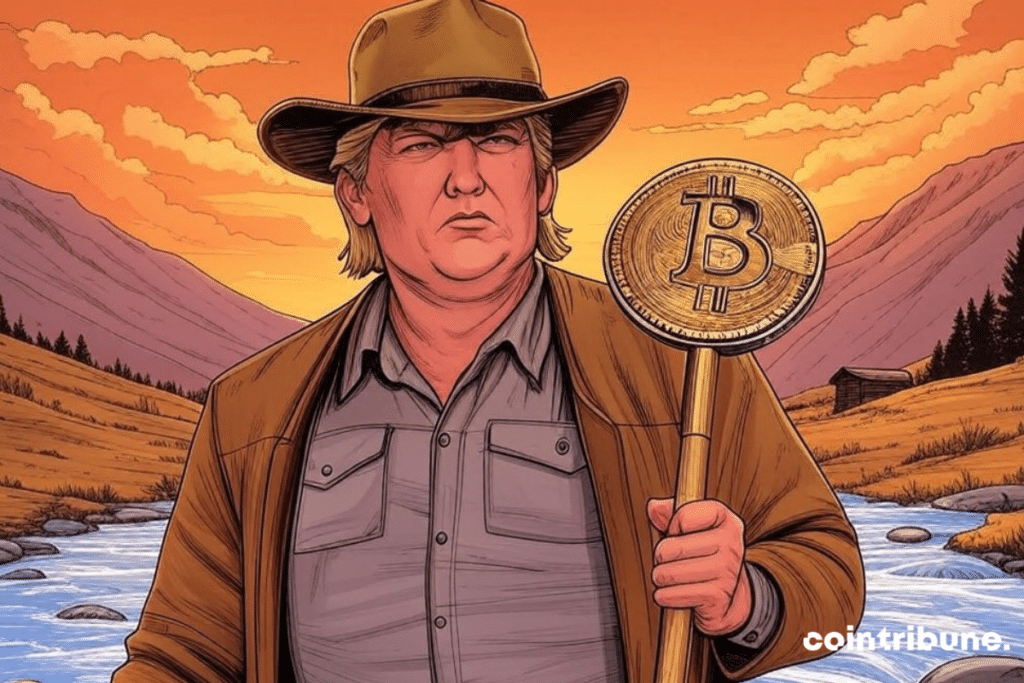Crypto-Backed U.S. Fund? Trump Fuels Uncertainty
Donald Trump, who usually thrives on dazzling promises, has taken his time with crypto. But recently, he hinted that the time has come to tackle it. With the creation of an American sovereign fund, observers are wondering if he plans to use it to invest heavily in bitcoin and other crypto-assets.

United States: a sovereign fund tailored for crypto?
On Monday, Donald Trump signed a decree creating an American sovereign fund, triggering a wave of speculation in the crypto industry. Some analysts see in this initiative a springboard for the United States to establish itself as a leader in the digital asset sector.
Austin King, co-founder of Omni Network, suggests that Trump could bypass the usual bureaucracy to acquire bitcoin through this fund.
A theory supported by the visible backing from several figures in the administration, including Howard Lutnick, the very pro-crypto Secretary of Commerce.
- Sovereign funds currently manage over $13 trillion;
- Norway already holds $355 million in Bitcoin;
- BlackRock estimates that such initiatives could propel bitcoin to $700,000.
If this fund comes to fruition, it could grant new legitimacy to crypto, encouraging other investors to take the plunge. But all is not so simple: between volatility and vague regulations, the integration of crypto-assets into a sovereign fund remains a risky bet.
Donald Trump and his bet on bitcoin
Trump has never hidden his interest in bitcoin. According to Ishmael Green, a crypto-specialized lawyer, the former President would personally hold nearly half a billion dollars in crypto, including a substantial amount in Ethereum. It’s safe to say he’s not entering this sector as a tourist.
This desire to assert American dominance in crypto could fit into a broader strategy.
Alex Jones claims that Trump plans to integrate TikTok into this same sovereign fund, in order to make it a financial and geopolitical weapon. For his part, Pete Rizzo emphasizes that the fund will be managed by two ardent supporters of Bitcoin. Quite a program.
But this choice carries risks. Mauricio Mondragon, an expert in crypto asset management, recalls that this type of governmental investment raises thorny security and regulation questions.
How to store these assets? How to protect them from wild market fluctuations? So many questions remain unanswered.
Crypto regulation on hold
Behind this poker move, the issue of crypto regulation in the United States remains a minefield. While the idea of a sovereign fund fueled by bitcoin excites maximalists, it worries regulators. The debates are likely to be heated, between those who want to make crypto a pillar of the American economy and those who fear a blow to monetary sovereignty.
The Trump administration seems ready to play acrobats. Spencer Farrar, partner at Theory Ventures, points out that this fund could give a boost to the legitimacy of crypto in the United States. Especially since privatization has already shown its worth for the adoption of new technologies.
But for this to work, it will be necessary to resolve the structural issues related to the management and security of crypto-assets.
In short, between the enthusiasm of maximalists and the caution of institutions, the future of this sovereign fund looks tumultuous.
Just yesterday, bitcoin dropped to $91,530, before bouncing back. A tumble that some attribute to Trump, accused of reigniting the trade war with economic giants like China, Canada, and Mexico. The timing is perfect: just as his sovereign fund prepares to take action. Coincidence? Not so sure.
Maximize your Cointribune experience with our "Read to Earn" program! For every article you read, earn points and access exclusive rewards. Sign up now and start earning benefits.
La révolution blockchain et crypto est en marche ! Et le jour où les impacts se feront ressentir sur l’économie la plus vulnérable de ce Monde, contre toute espérance, je dirai que j’y étais pour quelque chose
The views, thoughts, and opinions expressed in this article belong solely to the author, and should not be taken as investment advice. Do your own research before taking any investment decisions.